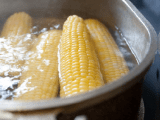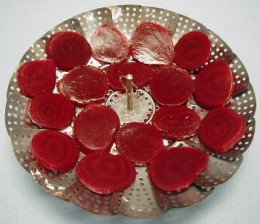
Blanching is a process in which vegetables are lowered into boiling water for a specific time. The vegetables are subsequently dropped into ice water to quickly cool, then dried and placed in freezer containers. Freezing slows down enzyme processes, but it doesn’t stop them. Blanching is recommended to assure vegetables will taste as fresh as possible after they have been frozen.
That’s because blanching stops enzyme activity. Enzymes in produce help it ripen, and continue to do their work even after the produce has been picked. By stopping the enzyme action, blanching prevents the produce from becoming overripe. Blanching also helps retain color, flavor, texture and nutrients. Blanching also helps remove dirt and small organisms from the produce.
It is important to look up the specific amount of time each vegetable needs to be blanched and follow those guidelines. If the vegetable is under-blanched, it can actually speed up the enzyme processes. If the vegetable is over-blanched, the nutritional value, flavor, color and texture can be negatively affected.
Blanching is also an important step in dehydrating vegetables. Learn more in this publication from the University of Georgia.
Information on blanching various vegetables can be found in these recipe resources at Preserve it Fresh, Preserve it Safe.
